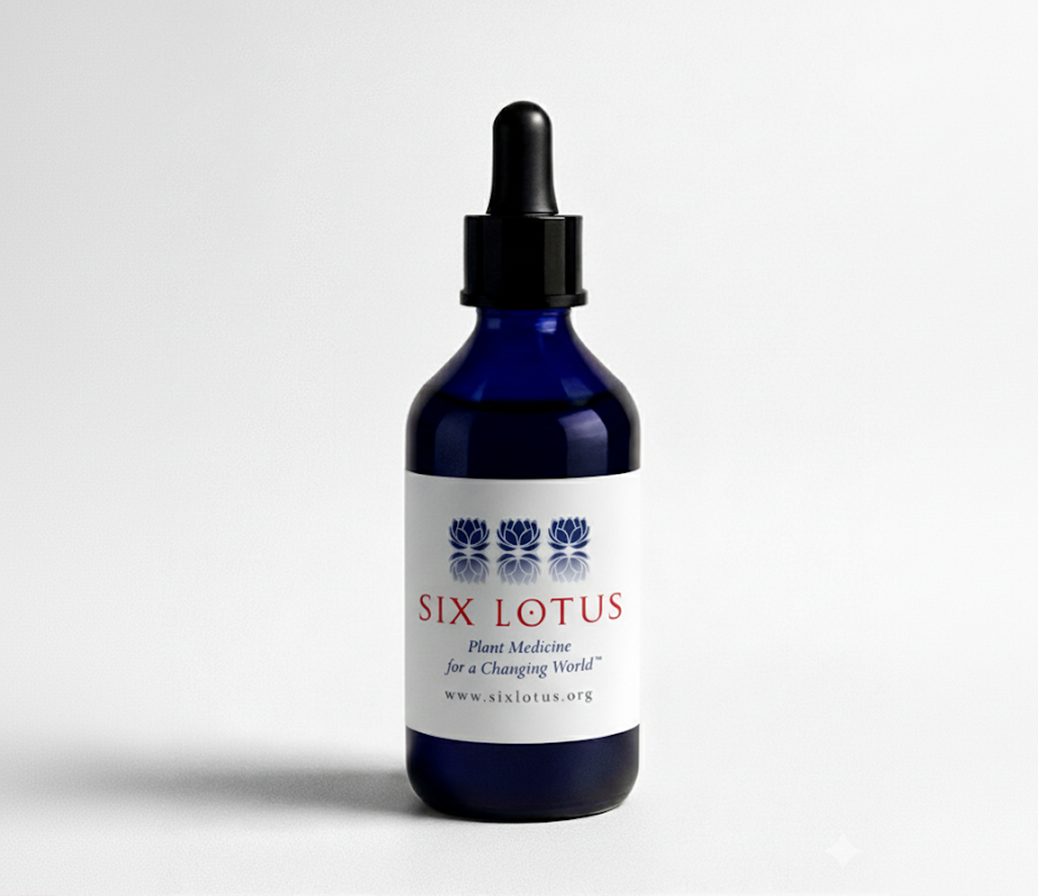AutoImmune
Helps maintain immune balance and supports the body’s natural defenses.
A 60mL bottle lasts 1.8 months for an adult. $42 USD.
The AutoImmune Tincture is a botanical formulation developed to modulate immune system reactivity, calm inflammatory responses, and support barrier integrity and nervous system resilience in individuals with autoimmune tendencies. Its combination of immunomodulatory, adaptogenic, and neuroregulatory herbs offers support for both systemic balance and stress reduction. The formulation is prepared in high-grade non-GMO French vodka to ensure optimal extraction of diverse phytochemical classes.


Key Botanical Components and Mechanisms
Nymphaea caerulea (blue lotus)
This plant provides neurocalming aporphine alkaloids like nuciferine, which may aid in autonomic balance and anxiety reduction—an important factor in autoimmune flare-ups that correlate with heightened sympathetic activation.
Sesamum indicum (white sesame seeds)
Sesame seeds offer lignans such as sesamin and sesamolin that support antioxidant and anti-inflammatory pathways, particularly through activation of NRF2. This is vital in controlling oxidative stress implicated in autoimmune pathogenesis.
Althaea officinalis (marshmallow root)
A classic mucosal restorative, marshmallow root provides polysaccharides that soothe and heal epithelial linings, helping to restore gut integrity and immune tolerance—key issues in autoimmune conditions such as leaky gut and food antigenicity.
Arctium lappa (burdock root)
Known for its detoxifying, anti-inflammatory, and liver-supportive actions, burdock root aids in lymphatic circulation and elimination of metabolic waste products, reducing systemic burden in autoimmune states.
Schisandra chinensis (schisandra berry)
Schisandra is an adaptogen that supports hepatic detoxification and adrenal balance. Its lignans also demonstrate immunomodulatory effects, potentially stabilizing cytokine responses and protecting tissues from autoimmune-driven inflammation.
Valeriana officinalis (valerian root)
Valerian has well-documented GABAergic effects, aiding in parasympathetic activation and stress recovery. By supporting restorative sleep and reducing HPA axis overdrive, valerian indirectly contributes to immune regulation and flare prevention.
Solvent System
Non-GMO French Vodka: This 40% ethanol base ensures the broad extraction of both water- and alcohol-soluble phytochemicals while maintaining microbiological integrity. It functions as a stable carrier for botanical constituents with minimal allergenic risk.
Summary
The AutoImmune tincture is formulated to promote immune system equilibrium by combining herbs with anti-inflammatory, adaptogenic, barrier-repairing, and calming properties. Together, these botanicals aim to reduce flare-up risk, support gut–immune axis integrity, regulate stress responses, and reduce oxidative burden. It may serve as a helpful adjunct for individuals with autoimmune disorders seeking integrative support.
What You Can Do To Support Your Body
Goal: Support balanced immune responses and healthy inflammation.
Diet:
• Fruits: Blueberries, cherries, pineapple (bromelain)
• Vegetables: Sweet potato, kale, Brussels sprouts, sea vegetables (iodine in moderation)
• Herbs/Spices: Turmeric, ginger, cinnamon
• Fungi: Reishi, shiitake
• Minerals: Magnesium (leafy greens, nuts), selenium (Brazil nuts), zinc (pumpkin seeds)
• Beverages: Green tea, rooibos, turmeric-ginger infusions
Lifestyle: Low-impact daily movement, adequate rest, stress-reducing practices, and identifying personal trigger foods.
Why diet matters: Anti-inflammatory and gut-supportive foods help maintain immune balance, working in harmony with the tincture’s supportive properties.
These statements have not been evaluated by the Food and Drug Administration. This product is not intended to diagnose, treat, cure, or prevent any disease.
References
Bone, K. and Mills, S., 2013. Principles and Practice of Phytotherapy: Modern Herbal Medicine. 2nd ed. Churchill Livingstone.
Bowe, S.J., et al., 2021. ‘Autoimmunity and oxidative stress in chronic disease’, Oxidative Medicine and Cellular Longevity, 2021, pp.1–10.
Chevallier, A., 2016. Encyclopedia of Herbal Medicine. DK Publishing.
Jin, R., et al., 2020. ‘Role of gut barrier dysfunction in the pathogenesis of autoimmune diseases’, Nutrients, 12(12), p.3729.
Li, Y., et al., 2022. ‘Immunomodulatory effects of Schisandra chinensis and its potential application in autoimmune diseases’, Frontiers in Pharmacology, 13, p.851396.
Panossian, A. and Wikman, G., 2008. ‘Effects of adaptogens on the central nervous system and the molecular mechanisms associated with their stress-protective activity’, Pharmaceuticals, 1(1), pp.83–114.
Winston, D. and Maimes, S., 2007. Adaptogens: Herbs for Strength, Stamina, and Stress Relief. Healing Arts Press.



